RuPay
RuPay is a card scheme, conceived and launched by the National Payments Corporation of India (NPCI) on 26 March 2012.[1] It was created to fulfil the Reserve Bank of India's (RBI) vision to have a domestic, open and multilateral system of payments.
 | |
| Product type |
|
|---|---|
| Owner | National Payments Corporation of India |
| Country | India |
| Introduced | 8 May 2014 |
| Markets |
|
| Tagline | ONE LIFE. ONE RuPay. |
| Website | www |
RuPay facilitates electronic payment at all Indian banks and financial institutions.[2] NPCI maintains ties with Discover Financial, JCB to enable RuPay card scheme gain international acceptance.[3][4]
In India, 90% of credit card transactions and almost all debit card transactions are domestic; however, the cost per transaction was low with RuPay compared to foreign card schemes.
Background
In 2009, RBI had asked the Indian Bank Association to create a non-profit payment solutions company which will design an indigenous payment card offering state-of-the-art technology that is secure, robust, scalable, simple and cost effective meeting the requirements of having domestic, open, multilateral system of payments. The card was tentatively referred as India Pay. After years of planning, NPCI had finalized the name of the proposed card as Rupay, a portmanteau of the words rupee and payment to avoid naming conflicts with other financial institutions using the same name.[5] The colours used in the logo are an allusion to the tricolour flag of India. NPCI conceived it as an alternative to Mastercard and Visa while consolidate and integrate various payment systems in India.[6][7]
RBI in its vision paper 2009–12 on payment systems in India said that the need for such a system arises from the absence of a domestic price setter that has caused the Indian banks to bear the high cost for affiliation and the connection with international card associations schemes like Visa and Mastercard resulting in the need for routing even domestic transactions which account for more than 90%, through a switch located outside the country.[8][9]
The RuPay scheme was launched on 26 March 2012. RuPay was dedicated to India on 8 May 2014, by the then President of India, Pranab Mukherjee, at the Rashtrapati Bhavan in New Delhi.[10][11][12]
Products
Consumer
RuPay Debit

As of July 2018, RuPay cards have been issued across the length and breadth of the country to saving-account and current-account holders of over 1100 banks in India. Apart from the main private-sector and public-sector banks, RuPay cards are also issued by cooperative banks (scheduled cooperative banks, district cooperative banks, state cooperative banks, urban cooperative banks) and regional rural banks (RRBs) in the country.
RuPay Credit
Rupay credit cards were in operation since June 2017, according to NPCI Managing Director and CEO A P Hota with eight public sector banks, one private sector bank and one cooperative bank issuing the card without any formal launch. A pilot project was going on to technically enabling more and more banks in RuPay credit cards with additional five public sector banks and by March 2018, NPCI plans to have 25 banks altogether on board.[13]
Total 14 Banks launched RuPay Credit cards
- HDFC Bank[14]
- IDBI Bank[15]
- United Bank of India[16]
- Union Bank of India[17]
- Punjab National Bank[18]
- Punjab & Maharashtra Co-operative Bank[19]
- Saraswat Bank[20]
- Corporation Bank[21]
- Canara Bank[22]
- Central Bank of India[23]
- Andhra Bank[24]
- Vijaya Bank[25]
- Syndicate Bank[26]
- Bank of India[27]
To further boost the fast-growing payment network, SBI Cards & Payments Services Ltd will soon launch RuPay credit cards. This is a last agreement that is left out between NPCI and SBI with the proposed product launch in fiscal 2019.[28]
RuPay Combo
The Union Bank of India launched RuPay Combo Debit Cum Credit Card in November 2018, the first RuPay card that facilitates both debit and credit transactions through a single card. The card has 2 EMVs and 2 magnetic stripes. [29][30]
Rupay Prepaid
Sodexo launched the Sodexo Multi-Benefit Pass in partnership with RuPay in May 2019. The card contains a magnetic stripe that allows users to pay for meal-benefits and a chip that allows them make purchases through the RuPay network. It can also be used to make online purchases on web portals that accept RuPay payments.[31]
Indian Railway Catering and Tourism Corporation (IRCTC) in collaboration with the Union Bank of India and the National Payment Corporation of India launched the IRCTC-UBI RuPay pre-paid card on 2015 to book tickets, do shopping and pay service bills. The card is a first-of-its-kind in the market as both virtual as well as physical cards are being issued to customers in two variants.[32][33]
Kochi1, a RuPay prepaid smart card rolled out by the Kochi Metro Rail Ltd (KMRL) with the help of the Axis Bank on March 2, 2019 became the first inter-modal transit card when its usage was extended to private buses with additional services including parking solutions in near future. It is launched under Kochi Smart City project and there are plans to extend the card to auto-rickshaws, ferries including that of the Kerala State Water Transport Department, proposed Water Metro, KSRTC buses so as to make it a Common Mobility Card in all respects.[34]
RBL Bank had partnered with GI Technology, a Wirecard subsidiary and India's largest wallet-based domestic money remittance company operating under the Brand Name ICashCard to launch RBL-ICASH co-branded, open loop RuPay Prepaid Card.[35]
ItzCash, India's largest digital payments company announced that it has partnered with RBL Bank to launch the country's first co-branded Rupay Platinum Prepaid Card. The multi-purpose card will roll out a suite of prepaid services across physical and virtual platforms. The service was launched to ensure seamless interoperability, access to unlocking multiple solutions and driving the prepaid program of the nation.[36]
RuPay Contactless
RuPay Contactless is a contactless payment technology feature that allows cardholders to wave their card in front of contactless payment terminals without the need to physically swipe or insert the card into a point-of-sale device. This is an EMV-compatible, contactless payment feature similar to Mastercard Contactless, Visa Contactless, and ExpressPay which use RFID technology.
The National Payments Corporation of India's (NPCI) card network RuPay has launched a contactless prepaid NFC card. It launched the contactless card for the Ahmedabad Smart City project in association with ICICI Bank and Ahmedabad Municipal Corporation. It also launched similar prepaid contactless cards for the Kochi Metro Rail Ltd (KMRL) and Bangalore Metropolitan Transport Corporation (BMTC) in association with Axis Bank.[37]
Contactless can currently be used on transactions up to and including ₹2000. On March, 2019 under ‘One Nation, One Card’ scheme a National Common Mobility Card (NCMC) for transportation was launched by Prime Minister Narendra Modi at a function in Ahmedabad on RuPay platform in order to avoid vendor lock-in and create an interoperable system under Make in India.[38][39]
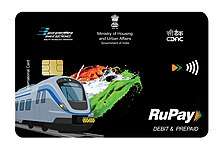
This is the latest development in the forward movement of the Interoperable Fare Management System. The main aim behind the card is to redefine payment for public transport systems and retail ease of access, at the cutting edge of digital payments. The project is under the purview of the Ministry of Housing and Urban Affairs, with the vision “One Card for all payments”. With this theme, the card needed to be accepted across multiple verticals. It then made sense to take up a card which is gaining a significant amount of adoption in the contactless payment space. The specifications for the NCMC programme are with the government and it is not owned by any specific body, hence all card payment schemes are welcome to join the programme.
Brihanmumbai Electricity Supply and Transport (BEST) buses are set to become the first public transportation in India to roll out the National Common Mobility Card (NCMC). The one nation, one card system will initially be implemented on a pilot basis from November, 2019 and will be available widely only from 2020. More than 10,000 BEST conductors will be given the hand-held devices that would be able to scan the NCMC cards with just one tap, alongside generating paper tickets.[40]
Visa is ready with the specifications to start issuing cards on the NCMC network and has started discussions with banks to issue their cards on NCMC as well, but it will take some time for the cards to start getting rolled out in the market.[41] Just weeks after its biggest competitor Visa, Mastercard set to join One Nation One Card project.[42]
After discussions with Bharat Electronics Limited (BEL) and Centre for Development of Advanced Computing (C-DAC), Bangalore Metro Rail Corporation Limited (BMRCL) confirmed the trial run from 1 January 2020 with four automatic fare collection (AFC) gates at Nadaprabhu, Kempegowda and Byappanahalli stations. Passengers of Bangalore Metropolitan Transport Corporation (BMTC) buses and Metro trains on the Majestic-Whitefield route will be able to use the card. Existing AFC gates at Phase 1 metro stations will have to be upgraded while AFC gates at Phase 2 metro stations operational by 2024 will accept new cards. Around 11,000 old electronic ticketing machines will be replaced with new android-based ones of which around 2,000 have already been changed to accept the card.[43]
State Bank of India (SBI) in collaboration with Indian Railway Catering and Tourism Corporation (IRCTC) launched SBI-IRCTC RuPay contactless card on 28 July 2020 to reward frequent railway travellers in India with the proposal of maximum savings during the journey period. The card uses Near Field Communication (NFC) technology and can be used by the railway travellers for benefits on retail, dining and entertainment besides transaction fee waivers.[44]
RuPay Global
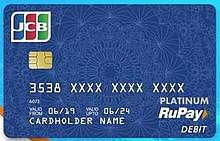
The NPCI started issuing global cards in 2014.[45] Singapore has offered assistance to promote India's digital payment network RuPay card overseas by becoming its first international partner.[46] On March 7, 2012, NPCI entered into a strategic partnership with Discover Financial Services (DFS) for RuPay, enabling the acceptance of RuPay Global Cards to utilize the Discover, Diners Club International and PULSE networks for international purchases and cash access outside of India. Both companies were also working to implement D-PAS, Discover's EMV technology to offer chip-based cards to RuPay card members.[47] The cards are accepted by over 4.1 crore (41 million) merchants and 18 lakh (1.8 million) ATMs across 190 countries.
NPCI with JCB launched RuPay-JCB Global card on July 22, 2019. After extending domestic POS terminal and ATM support for incoming foreign JCB card holders in 2017, NPCI entered into the second phase of partnership with the launch of co-branded card to further increase the international acceptance of RuPay. The card will offer special cashback program for POS transactions outside India in addition to selected popular international destinations for travellers. It will support additional services such as in-city JCB Lounges located in airports with round the year merchant promotions all over the world. While debit cards are only being issued initially through the partnership, credit and prepaid cards are also on the anvil.[48][48]
RuPay issued 6.4 crore (64 million) Global Cards between 2014 and March 2019.[49][50] RuPay has tied-up with international players like Discover, Japan Credit Bureau and China Union Pay to enhance its international acceptance and recently achieved a milestone of issuing 25 million RuPay – Discover global cards.[51]
RuPay has several agreements with other international payment networks. Some major examples include:
RuPay Select
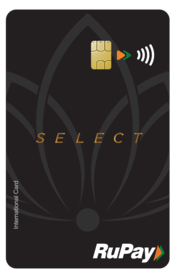
NPCI launched RuPay Select card in the year 2020 for customers especially from affluent section of the society. The card is different from previous offerings as it is independent of issuing bank that form partnership with various businesses to provide card specific benefits. Now all the benefits are curated under one package independent of bank partnerships, so as to stop customer to apply for multiple card schemes. The RuPay Select is for NPCI to capture the market-share of high spending customers and provide an Indian alternative against the premium offerings from Mastercard, Visa etc.[53][54]
List of Banks issue RuPay Select Debit/Credit Cards - RuPay Select | RuPay
BharatQR
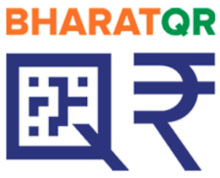
This is developed by NPCI in collaboration with Mastercard, and Visa as an integrated interoperable QR code based payment system and was launched in September 2016. It facilitates users to transfer their money from one source to another without the need of physical cards. The money transferred through BharatQR is received directly in the user's linked bank account using IMPS. It provides a common interface between RuPay, Mastercard, Visa, American Express as opposed to other such individual proprietary systems.[55] BharatQR is supported on both Android and iOS devices. Bijlipay, an end to end digital payment solutions company, is the first Indian Point-of-Sale (PoS) devices providing company to enable Bharat QR code on the screens of its POS machines. According to RBI, the Bharat QR Code is the world's first inter-operable payment acceptance solution.[56]
Recurring Payment
RuPay Card is expected to roll out recurring payments without the two-factor authentication for transactions of less than ₹2,000 early next year, National Payments Corporation of India (NPCI) chief operating officer Praveena Rai said on Friday. The technology work is going on and the entire ecosystem is gearing up for the shift.[57]
Commercial
RuPay Business
NPCI launched RuPay Business Credit card for corporate clients on 23 July 2020 at Global Fintech Fest in partnership with State Bank of Mauritius (SBM). Fintech startup Yap helped in developing the application programming interface (API) powering the card while EnKash will provide dedicated customer support and expense management service. SBM is targeting the product towards SMEs and MSMEs. It will be available through State Bank of Mauritius touch-points across India which is undergoing business expansion. RuPay Business credit card is offering instant bulk payout, 30-day credit period on business purchase, automated goods and services tax (GST) and a dashboard to manage business spending that will further help the clients move towards more powerful corporate offerings from NPCI in future.[58][59]
RuPay Pro
Rupay Pro credit card is also launched on 23 July 2020 at Global Fintech Fest but is mainly oriented towards young individual entrepreneurs. It is offering variable billing cycle, travel expenses, rental payments with dedicated customer services and expense tracking mechanism. It supports digital and paperless know you customer (KYC) process on-boarding.[60][61]
Acceptance
Domestic
India
RuPay cards are accepted at almost all ATMs across India.[62] According to the data published by the National Payments Corporation of India, there are well over 200,000 ATMs[63] and more than 2,614,584 PoS terminals in India in the RuPay network. In addition to ATMs and PoS terminals, RuPay cards are accepted online on most domestic payment gateways and some international payment gateways (through its alliances with other networks).[64][65]
RuPay cards are accepted at 97% of all PoS terminals in India. RuPay has partnered with 39 PoS-acquiring banks in India to accept their cards at PoS terminals located at different merchant locations.
RuPay cards are yet not accepted as a valid payment method on Google Play for making purchases in apps and games.[66] PayPal now supports RuPay card system.[67]
International
Singapore
The Prime Minister of India, Narendra Modi, launched the RuPay scheme in Singapore on 31 May 2018. The launch took place in parallel with related services offered by the NPCI, such as UPI and BHIM. The State Bank of India, Singapore will be the first country to issue RuPay cards in the country.[68]
The RuPay digital payments system was linked up with Singapore's 33-year-old Network for Electronic Transfers (NETS). RuPay users will be able to make payments at all NETS acceptance points across Singapore. Holders of Singapore NETS will be able to make online purchases on e-commerce merchants that accept RuPay as well as use the 28 lakh (2.8 million) RuPay PoS terminals in India. Holders of NETS cards would also be able to withdraw cash at any ATM in India.
Bhutan
Following Bhutanese Prime Minister Lotay Tshering visit to India on 28 December 2018, Indian Prime Minister Narendra Modi announced that RuPay cards would be introduced in Bhutan.[69][70] RuPay cards were officially launched in Bhutan on 17 August 2019 with Prime Minister Modi making the first RuPay transaction in the country with a purchase from Simtokha Dzong.[71]
Reserve Bank of India (RBI) and Royal Monetary Authority of Bhutan (RMA) announced that they would integrate the financial switches of the two countries in order to simplify cross border transactions. India will support an estimated ₹2.7 crore (US$380,000) cost of the integration work. Post-integration, RuPay card holders can use their cards across all ATMs and POS terminals in Bhutan. The RMA maintains an account with the State Bank of India. Any withdrawal by a RuPay card holder in Bhutan would be settled through an instant credit into the RMA's account. The arrangement is expected to benefit both countries by minimizing foreign currency outflow. Visa and MasterCard payments are settled in US dollars, while RuPay can be settled in rupees. The Bhutanese Ngultrum is fixed at a one-to-one exchange rate with the Indian rupee making settlement easy for both countries. In addition, Bhutanese banks will issue RuPay cards that will allow Bhutanese card holders to access the RuPay network in India.[72][73]
Maldives
Prime Minister Narendra Modi announced that RuPay cards would be launched in the Maldives during his address to the People's Majlis (the Maldivan Parliament) on 8 June 2019. Modi added that the introduction of RuPay would increase the number of Indian tourists visiting the Maldives.[74][75]
4 December 2019, BML partners with NPCI to introduce RuPay Cards in Maldives. Bank of Maldives (BML) and National Payment Corporation of India (NPCI) signed a Memorandum of Understanding on Wednesday, to introduce the acceptance of RuPay cards in Maldives. BML will accept RuPay cards on the bank's ATMs, POS machine and other digital channels. BML revealed that the issuance of RuPay co-branded prepaid cards by the bank, and the acceptance of the co-branded cards across ATMs, POS machines and digital channels in India will also take place in due time.[76]
UAE
A Memorandum of Understanding (MoU) to establish a technology interface between the payment platforms in India and UAE was exchanged between the National Payments Corporation of India and UAE's Mercury Payments Services. UAE is the first country in the Gulf where RuPay has been launched. Around 175,000 merchant acceptance locations of 21 businesses and 5,000 ATMs in the UAE will soon start accepting India's RuPay card, it was announced on Saturday. Around 175,000 merchant acceptance locations of 21 businesses and 5,000 ATMs in the UAE will soon start accepting it. RuPay Cards will charge 10% of fees in comparison to other card issuers in UAE. Three banks in the UAE – Emirates NBD, Bank of Baroda and First Abu Dhabi Bank will start issuing the RuPay card. Businesses that will adopt RuPay are NMC Healthcare, Lulu Group, Aster DM Healthcare, Landmark Group, Sobha Ltd, Apparel Group, Nikai Group, Regal Group of Companies, ITL Cosmos, Jashanmal National Company LLC, Allana Group FMCG Products, Petrochem Middle East, Transworld Group, Al Dobowi Group, VPS Healthcare, UPL Group, Conares, Al Maya Group, EPS Facilities Services Group, Emaar and DP World, according to the Indian Embassy in Abu Dhabi. UAE receives close to 3 million Indian tourists annually. Acceptance of Rupay card in UAE will lower the charges as tourists will save on exchange rate.[51][77]
Bahrain
An MoU on 25 Aug 2019 was signed between the National Electronic Payments Network (BENEFIT), a Bahrain company handling ATM and POS transactions among others, and National Payments Corporation of India (NPCI) for launch of RuPay card in the Gulf Kingdom. The MoU would made it possible for Indian expats to pay and send money home in Indian Rupee by using RuPay cards.[78]
Saudi Arabia
Indian Ministry of External Affairs (MEA) announced on 24 October 2019 that to help domestic pilgrims visiting Mecca Madina, Prime Minister Narendra Modi will launch RuPay card in Saudi Arabia during a state visit to the gulf country on 29 October 2019.[79]
Myanmar (Burma)
Myanmar have decided to work together with India on launch of RuPay enabled cards at the earliest and explore the creation of a digital payment gateway, according to a joint statement issued by the President of Myanmar, Win Myint on 28 Feb 2020. NPCI needs to adhere to Myanmar financial regulation and laws which would not only stimulate the economy of Myanmar but further facilitate cross border tourism and business from India.[80]
Australia
On India's Prime Minister virtual meet with Australian Prime Minister on 4 June 2020, both the countries are exploring the possibility to launch Indian Rupay Card in Australia [81]
South Korea
BC Card announced on 23 August 2017 that it has signed a bilateral memorandum of understanding (MOU) for strategic network partnership with National Payments Corporation of India (NPCI). Through the MOU, the two companies have agreed to provide services allowing transactions using domestic-use-only cards issued by BC Card in India and RuPay in South Korea. There are also plans to expand the areas of cooperation through the launch of BC Card-NPCI “co-branded” cards and development of new business models.[82][83] NPCI released a circular on 8 April 2020 on acceptance of RuPay cards in South Korea.[84]
Market share
RuPay's parent organisation, the National Payments Corporation of India (NPCI), has been backed by 10 leading banks. Of these are 6 public-sector banks: State Bank of India, Bank of Baroda, Punjab National Bank, Canara Bank, Union Bank of India, and Bank of India; 2 private-sector banks: ICICI Bank and HDFC Bank; and 2 foreign banks: Citibank and HSBC.[85] Banks in India are authorised to issue RuPay debit cards to their customers for use at ATMs, PoS terminals, and e-commerce websites. RuPay's market share rose from 0.6% in 2013 to 50% by November 2018.[86]
As of December 2016, NPCI has issued 31.7 crore (317 million) RuPay cards which include 20.5 crore (205 million) of cards to the Jan Dhan Yojana account holders. Usage of RuPay cards at points of sale and for e-commerce together that used to be about 3 lakh (0.3 million) per day (pre-demonetisation) soared seven times to about 21 lakh (2.1 million) (post-demonetisation) with a targeted daily volume of 50 lakh (5 million) transactions through RuPay by the end of 2017.[87]
RuPay surpassed Visa as the largest payment card network in India by number of transactions in June 2017, recording 37.5 crore (375 million) transactions.[88]
About 60 crore (600 million) cards have been issued as of March 2019 by 1,100 banks giving it more than 58% market share in the country's card issuance market, beating the much older duo of Visa and Mastercard by number of cards issued.[89] RuPay holds about 30% market share by volume and value of transactions made.[90] According to NPCI data released in May 2019, 112.7 crore (1,127 million transactions) valued at ₹1,17,400 crore (US$17 billion) were made on RuPay cards during the 2018–19 fiscal year. RuPay held 58% of the market share by number of cards issued, 30% by number of point of sale transactions, and 25% by number of online transactions from around 11% two years ago.[91]
RuPay charges transaction processing fees that are approximately 23% lower than those charged by Visa and Mastercard.[88] The NPCI charges a flat-fee per transaction of 60 paise from acquiring bank and 30 paise from the card issuing bank. For example, if a customer made a transaction with their RuPay card at a POS terminal operated by another bank, then the customer's bank (the bank that issued the card) would pay 30 paise to the NPCI while the bank that operates the POS terminal (the acquiring bank) would pay 60 paise to the NPCI.[92]
RuPay reported 100 crore (1 billion) transactions through both online and offline merchant payment modes in financial year 2019, a nearly 70% jump compared to the 66.7 crore (667 million) transactions in financial year 2018, according to data sourced from the NPCI and the Reserve Bank of India. RuPay debit cards saw a growth of 32% in FY ’19 at 440 crore (4.4 billion) transactions compared to the previous year's 330 crore (3.3 billion) transactions.[93] Also, in terms of value, RuPay cards noted a rise of 80% in FY ’19, beating overall debit card payments which grew 30% compared to the previous fiscal year.[94] NPCI issued 591.5 million RuPay cards till December 2019 of which 229.02 million cards were used for ATM transactions and 100.93 million on PoS terminals. RuPay card usage for both ATM and PoS transaction is topped by Maharashtra for the year 2019.[95]
During COVID-19 pandemic, consumer usage of RuPay platform in India was hovering at 87% to 98% by spending volume above its foreign competitors Mastercard and Visa, which were at 70% to 86% due to reduction in discretionary spending as of March 2020.[96]
Jan Dhan Yojana
RuPay cards got a major boost through the Pradhan Mantri Jan Dhan Yojana they were issued to all Jan Dhan account holders.
Until June 2018, 24.2 crore (242 million) RuPay Debit Cards were issued under the Jan Dhan Yojana against the 92.5 crore (925 million) debit cards issued by the banking industry. The NPCI held consultations with small finance bank licensees on the use of RuPay cards and is set to emerge as the dominant debit card with small finance banks.[97]
Due to Digital India initiative and JAM trinity, the number of RuPay card in 2016 was less than half at 23 crore (230 million) which was later surged to 56 crore (560 million) as of November 2018. In 2013 ATM transactions constituted 90% of the total number and 95% of the total value. In 2018, PoS transactions have expanded to cover 30% of the total number and 10% of the total value of debit card transactions.[98] Till January 2020, 298.6 million Jan Dhan Yojna account holders were issues RuPay debit cards. With 81% operational Jan Dhan Yojana accounts, 29.14 crore RuPay debit cards are issued as of 19 February 2020 which is 76% of holders.[99]
Initiative for farmers
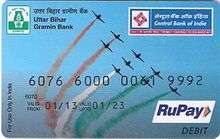
RuPay also provides a unified "Kisan card", issued by banks across the country as the Kisan Credit Card, enabling farmers to transact business on ATMs and PoS terminals.[100]
PUNGRAIN (Punjab Grains Procurement Corporation Ltd) pays commission agents through the RuPay Debit Card and developed a commission agent network called the Kisan Arhtia Information and Remittance Online Network (KAIRON) with the help of the National Payments Corporation of India.[101][102][103]
Kotak Mahindra Bank, in partnership with RuPay, rolled out an initiative for financial inclusion, where the dairy farmers across 75 cooperative societies of Amul in regions of Burdwan and Hooghly of West Bengal will be able to get their payments directly into their accounts on the same day as the sale of their milk.[104]
The same model is planned to be adopted in the state of Gujarat where 1200 cooperative societies comprising over 3,00,000 dairy farmers will be the part of the programme.[105]
In 2017 post demonetisation, the government decided that NABARD will coordinate the conversion of operative/live Kisaan Credit Cards into RuPay ATM cum Debit Kisaan Credit Cards by Cooperative Banks and Regional Rural Banks on priority.[106]
See also
References
- "NPCI's RuPay debit cards to rival Visa and Mastercard". The Economic Times. 27 March 2012. Retrieved 25 July 2019.
- "Finally, India card Rupay to replace Visa, MasterCard – Times of India". The Times of India. Retrieved 3 September 2019.
- "Discover Financial Services And National Payment Corporation Of India Announce Strategic Alliance Enabling Increased Network Acceptance". investorrelations.discover.com. Retrieved 3 September 2019.
- July 2019, 24th. "First JCB card issued in India with NPCI partnership". FinTech Futures. Retrieved 25 July 2019.
- "IndiaPays name changed to RuPay". The Financial Express. 28 December 2010. Retrieved 3 September 2019.
- "Finally, India card Rupay to replace Visa, MasterCard – The Times of India". Times of India. Articles.timesofindia.indiatimes.com. 21 March 2011. Archived from the original on 21 March 2011. Retrieved 14 August 2014.
- "Visa & MasterCard gone. Rupay card, bring it on". Moneycontrol. Retrieved 25 July 2019.
- "Reserve Bank of India – Reports". m.rbi.org.in. Retrieved 3 September 2019.
- https://rbidocs.rbi.org.in/rdocs/PublicationReport/Pdfs/VIS01092009.pdf
- "Pranab Mukherjee dedicates India's own payment gateway 'RuPay' to nation | Latest News & Updates at Daily News & Analysis". DNA India. Dnaindia.com. 9 May 2014. Retrieved 14 August 2014.
- "India's own payment gateway 'RuPay' launched". Livemint. Livemint. 8 May 2014. Retrieved 14 August 2014.
- Our Bureau. "Soon, you can use the RuPay platform to shop abroad, book railway tickets | Business Line". Business Line. Thehindubusinessline.com. Retrieved 14 August 2014.
- "Rupay credit cards already operational: NPCI chief A P Hota". The Economic Times. 12 July 2017. Retrieved 25 July 2019.
- http://www.hdfcbank.com%7Curl=https://www.hdfcbank.com/personal/credit_card/bharat-card
- http://www.idbibank.in%7Curl=https://www.idbibank.in/winnings-credit-card.asp
- http://www.unitedbank.co.in%7Curl=https://creditcard.unitedbank.co.in/HomePage/unauth/index.html?page
- http://www.unionbankofindia.co.in%7Curl=https://www.unionbankofindia.co.in/english/personal-creditcard-superpremium.aspx
- http://www.pnbcard.in%7Curl=https://www.pnbcard.in/login/types6.html
- http://www.pmcbank.com%7Curl=https://www.pmcbank.com/english/Cards-Home.aspx
- http://www.saraswatbank.com%7Curl=https://www.saraswatbank.com/content.aspx?id=Credit-Cards
- http://www.corpbank.com%7Curl=https://corpbank.com/node/134670
- http://www.thehindubusinessline.com%7Curl=https://www.thehindubusinessline.com/money-and-banking/canara-bank-launches-rupay-credit-card/article24441725.ece
- http://www.ccard.centralbankofindia.co.in%7Curl=https://ccard.centralbankofindia.co.in/login/rupay_select_credit_card.html
- http://www.onlinecreditcards.andhrabank.in%7Curl=https://onlinecreditcards.andhrabank.in/HTML/ADB_CC_RUPAY_SELECT.jsp
- evijaya.bankofbaroda.in|url=https://www.evijaya.bankofbaroda.in/Card-Services/Credit-Cards/Vijaya-Rupay-Credit-Card
- rajmanglam.com|url=https://www.rajmanglam.com/reviews/how-to-apply-for-syndicate-bank-rupay-select-credit-card.html
- http://www.bankofindia.co.in%7Curl=https://www.bankofindia.co.in/Details/CRuPayCard
- Singal, Aastha (2 September 2019). "Making a Case for Wider Acceptance of Rupay". Entrepreneur. Retrieved 2 September 2019.
- "Debit-cum-credit card: Should you opt for this combo card?". Moneycontrol. Retrieved 5 May 2019.
- "Endgame for Debit, Credit Card? Now, swipe this for both functions, more reward points". Zee Business. 5 May 2019. Retrieved 5 May 2019.
- "Sodexo launches multi-benefit pass in India". Moneycontrol. Retrieved 8 June 2019.
- "Now, book railway tickets with RuPay pre-paid debit cards". www.businesstoday.in. Retrieved 2 September 2019.
- www.ETtech.com. "Indian Railways launches RuPay prepaid debit card service – ETtech". ETtech.com. Retrieved 2 September 2019.
- E, Krishna Kumar K. (3 March 2019). "Kochi1 card services in private buses". Deccan Chronicle. Retrieved 2 September 2019.
- "RBL and GI Technology to launch open loop RuPay Prepaid card". Finextra Research. 28 November 2016. Retrieved 2 September 2019.
- "ItzCash partners with RBL Bank to launch RuPay platinum prepaid wallet". www.indiainfoline.com. Retrieved 2 September 2019.
- "RuPay launches contactless NFC prepaid cards". MediaNama. 26 June 2017. Retrieved 2 September 2019.
- "India launches National Common Mobility Card for seamless travel". Buzz travel | eTurboNews |Travel News. 8 March 2019. Retrieved 21 July 2019.
- "One Nation One Card: All you need to know about the National Common Mobility Card launched by PM Modi". The Financial Express. 7 March 2019. Retrieved 21 July 2019.
- "BEST to become first undertaking to implement 'One Nation, One Card'". Moneycontrol. Retrieved 21 August 2019.
- www.ETtech.com. "Visa set to board govt's mobility card – ETtech". ETtech.com. Retrieved 21 August 2019.
- www.ETtech.com. "Mastercard set to join govt's One Nation One Card project – ETtech". ETtech.com. Retrieved 21 August 2019.
- Oct 10, Christin Mathew Philip | TNN | Updated:; 2019; Ist, 11:36. "Bengaluru: Common mobility card may be trialled from January 1 | Bengaluru News - Times of India". The Times of India. Retrieved 20 October 2019.CS1 maint: extra punctuation (link) CS1 maint: numeric names: authors list (link)
- "SBI Cards, IRCTC launch co-branded contactless credit card on RuPay platform". Moneycontrol. Retrieved 29 July 2020.
- Mishra, Rajat (17 August 2019). "Rupay Makes The Debit And Credit Space More Competitive". Outlook India. Retrieved 3 September 2019.
- "Singapore offers help to promote RuPay card overseas". The Economic Times. 1 November 2017. Retrieved 25 July 2019.
- "Press Detail". Diners Club International (in Portuguese). Retrieved 25 July 2019.
- www.ETtech.com. "JCB International partners with NPCI to launch RuPay JCB Global cards – ETtech". ETtech.com. Retrieved 25 July 2019.
- "Are banks shying away from offering RuPay cards to affluent customers?". Hindu Business Line. Retrieved 8 June 2019.
- "RuPay card success: Transactions grow to Rs 1,17,400 crore in FY19". Zee Business. 18 May 2019. Retrieved 8 June 2019.
- "RuPay to only charge 10% of fees charged by other card issuers in UAE". gulfnews.com. Retrieved 24 August 2019.
- Bureau, BW Online. "RuPay: The 'Made In India' Card Making Its Mark Globally". BW Businessworld. Retrieved 5 May 2019.
- "Business News Today, Stock Market News, Sensex & Finance News". Livemint. Retrieved 31 March 2020.
- "RuPay Select a gateway to premium wellness experiences". Hindustan Times. 30 March 2020. Retrieved 31 March 2020.
- "Bharat QR: Here are 5 things to know about the new cashless transaction mechanism". The Financial Express. 21 February 2017. Retrieved 3 September 2019.
- "India's first Bharat QR code recognising POS machine". Deccan Chronicle. 24 May 2017. Retrieved 3 September 2019.
- "RuPay may soon roll out recurring payments sans two-factor authentication". 30 November 2019.
- "NPCI launches RuPay commercial card". Moneycontrol. Retrieved 25 July 2020.
- Bora, Garima. "NPCI launches RuPay commercial card, SBM Bank and EnKash first to collaborate". The Economic Times. Retrieved 25 July 2020.
- "RuPay Commercial Cards | RuPay". www.rupay.co.in. Retrieved 25 July 2020.
- "SBM Bank India, EnKash, YAP and RuPay launch business credit card". @businessline. Retrieved 25 July 2020.
- "Press Detail | Diners Club International". Diners Club International. Retrieved 7 August 2016.
- "This Is How 2 Lakh ATMs In India Will Get A Complete Makeover". Huffington Post India. 11 November 2016. Retrieved 21 March 2018.
- Megha Mandavia (29 March 2013). "Come April, you can use RuPay even online | Latest News & Updates at". Daily News and Analysis. Dnaindia.com. Retrieved 9 February 2014.
- India, Press Trust of (21 June 2013). "NPCI launches e-commerce solution in RuPay Card". Business Standard India. Business Standard. Retrieved 9 February 2014.
- "Accepted payment methods on Google Play – India". Google Play Store.
- "PayPal CTO says in for the long haul in India, to back UPI soon". PayPal India.
- "PM launches RuPay in Singapore". Tribune India. June 2018.
- "PM Modi says Rupay cards soon to be launched in Bhutan to improve people to people contacts". APN News. Retrieved 8 April 2019.
- "PM Modi announces Rs 4500 crore assistance to Bhutan, Rupay cards in Himalayan nation". NewsroomPost. 28 December 2018. Retrieved 8 April 2019.
- "PM Modi launches RuPay card in Bhutan". Times of India. 17 August 2019.
- "RuPay Moves Towards Bhutan And India Towards Integrating South Asian Economies". Swarajya. Retrieved 8 April 2019.
- "Financial switches of Bhutan and India to be integrated soon". KuenselOnline. Retrieved 8 April 2019.
- "Terrorism, ferry service, cricket diplomacy: Everything that happened during Modi's Maldives visit". The Indian Express. 8 June 2019. Retrieved 8 June 2019.
- "Issuing RuPay card in Maldives will increase Indian tourists in Maldives: PM Modi". Yahoo News. Retrieved 8 June 2019.
- "BML partners with NPCI to introduce RuPay Cards in Maldives". The Edition.
- "Where you can use RuPay in the UAE now". gulfnews.com. Retrieved 24 August 2019.
- "RuPay launch in Bahrain soon, India signs MoU with Gulf country". in.news.yahoo.com. Retrieved 26 August 2019.
- "India to launch RuPay card in Saudi Arabia - Times of India". The Times of India. Retrieved 24 October 2019.
- "India, Myanmar sign 10 pacts to boost bilateral ties - The Hindu Business Line". The Hindu Business Line. Retrieved 28 February 2020.
- "India and Australia pump $12.7 million into AI - Business Insider". Business Insider. Retrieved 4 June 2020.
- "BC Card Signs MOU on Network Partnership with NPCI in India - bccard". bccard. Retrieved 23 August 2017.
- "BC Card Pushes into Indian Card Market - businesskorea". businesskorea. Retrieved 24 August 2017.
- "Interchange and Pricing circular for Acceptance of RuPay cards in Singapore, United Arab Emirates & South Korea" (PDF). NPCI. Retrieved 8 April 2020.
- Nair, Vishwanath; Vishwanathan, Vivina (7 January 2016). "NPCI's unified payment interface to start in April". Mint. Live Mint. Retrieved 17 September 2016.
- "Rupay shines! From limited presence in 2013 to capturing half of market now; 3 reasons behind stellar rise". The Financial Express. 11 November 2018. Retrieved 25 July 2019.
- "RuPay card usage surges 7 times: NPCI". The Economic Times. 28 December 2016. Retrieved 25 July 2019.
- "Rupay shines! From limited presence in 2013 to capturing half of market now; 3 reasons behind stellar rise". The Financial Express. 11 November 2018. Retrieved 5 May 2019.
- Pani, Priyanka (17 May 2019). "RuPay makes a quantum leap in 4 years". Business Line.
- Pani, Priyanka. "RuPay makes a quantum leap in 4 years". @businessline. Retrieved 8 June 2019.
- Pani, Priyanka. "RuPay makes a quantum leap in 4 years". Hindu Business Line. Retrieved 8 June 2019.
- "RuPay: How a six-year-old card gave the scare to global biggies such as Visa and Mastercard". The Economic Times. 13 November 2018. Retrieved 5 May 2019.
- Madgaonkar, Shreyes (1 August 2019). "RuPay passes 1 billion transactions milestone in FY 2019". The Tech Portal. Retrieved 1 August 2019.
- www.ETtech.com. "RuPay clocks 1 billion transactions, pips debit cards in usage – ETtech". ETtech.com. Retrieved 2 August 2019.
- "Almost 300 million RuPay cards have been issued to Jan Dhan account holders: Finance Minister". MediaNama. 5 March 2020. Retrieved 12 March 2020.
- "Indian eCommerce sees a drastic 30% decline during Janata Curfew". CIOL. 8 April 2020. Retrieved 8 April 2020.
- "RuPay debit cards to gain from small finance banks". Business Standard. Business Standard. 5 September 2016. Retrieved 17 September 2016.
- "Digital India Milestone: The Number Of Debit Cards Touches 1 Billion Mark With 560 Million RuPay Cards Of Jan Dhan Scheme". swarajyamag.com. Retrieved 25 July 2019.
- Surabhi. "Now, 76% of Jan Dhan a/c holders have RuPay debit cards". @businessline. Retrieved 29 February 2020.
- "RuPay: A New Indian Payment System" (PDF). Pacific Business Review International. Pacific Business Review International. Retrieved 17 September 2016.
- "Punjab government to make online payment to commission agents". The Economic Times. 31 March 2013. Retrieved 3 September 2019.
- "Wheat procurement begins today, Arthias to get payments online". indianexpress.com. Indian Express. 1 April 2013. Retrieved 9 February 2014.
- Chandigarh, PTI (31 March 2013). "Punjab govt to make online payment to commission agents | Business Line". Business Line. Thehindubusinessline.com. Retrieved 9 February 2014.
- "Kotak Bank rolls out financial inclusion plan for Amul workers | Business Line". Business Line. Thehindubusinessline.com. 17 December 2013. Retrieved 9 February 2014.
- Koul, Nisha (15 January 2014). "MICROCAPITAL BRIEF: Kotak Mahindra Bank Launches Financial Inclusion Programme for Amul Milk-Cooperative Members in West Bengal, India". MicroCapital. Retrieved 3 September 2019.
- "NABARD to monitor conversion of Kisan Credit Cards into RuPay Cards on mission mode". www.aninews.in. Retrieved 25 July 2019.